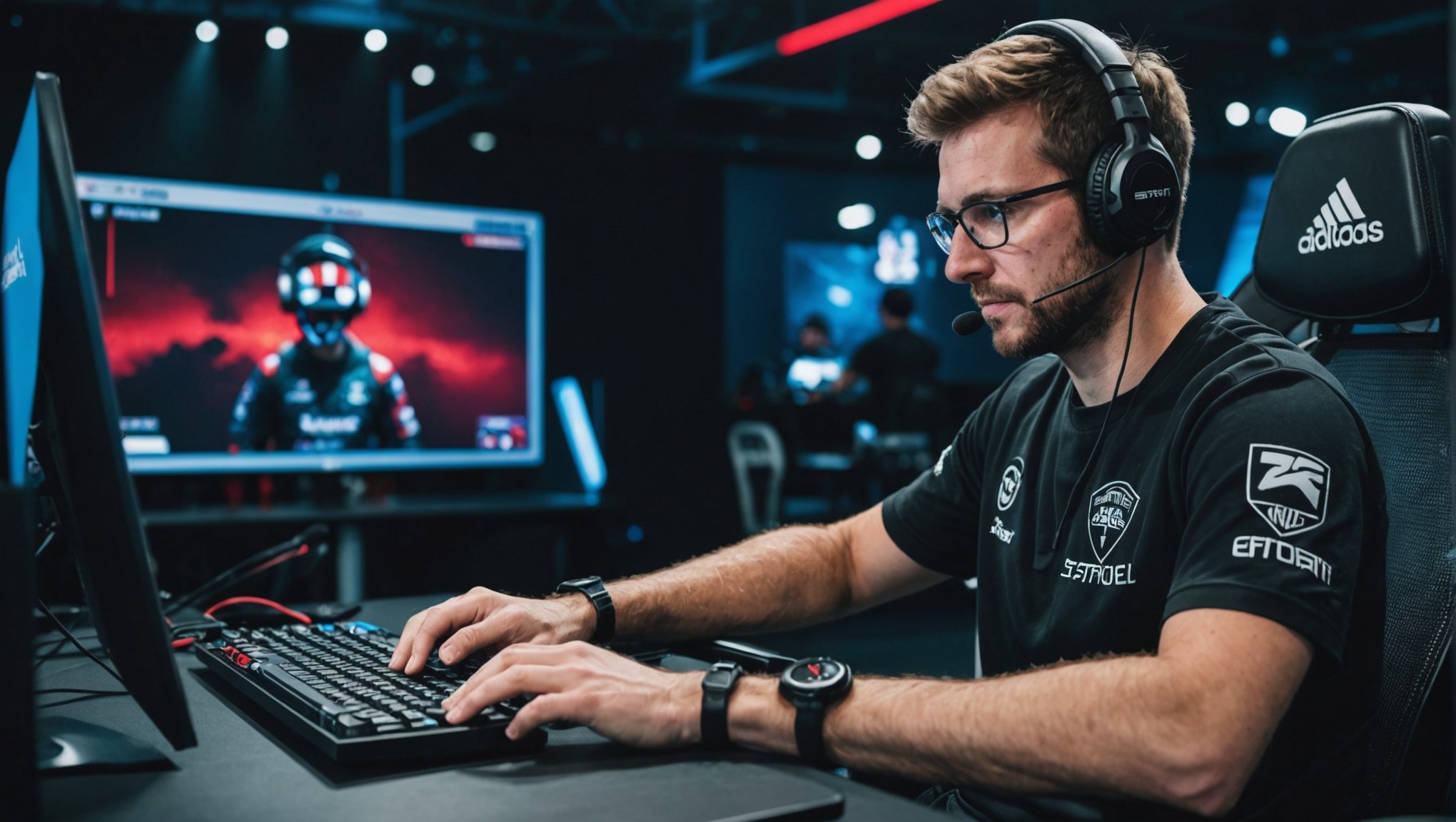Understanding Burnout in Esports Gamers
Burnout in esports describes a state of chronic physical and emotional exhaustion caused by prolonged stress, intense competition, and high-performance expectations. Symptoms of burnout include gaming fatigue, lack of motivation, decreased performance, and negative attitude toward the game. Unlike traditional sports, esports burnout often emerges from long hours of gameplay, the pressure to constantly perform, and the demanding nature of rapid in-game decision making.
In the UK, burnout prevalence among professional gamers is significant. The competitive gaming scene demands relentless dedication, which can lead to overwhelming stress. Surveys indicate that many players experience burnout early in their careers, even before reaching their performance peak. This trend is alarming as it highlights a pressing need for preventative measures and support systems within the gaming industry.
Also to see : Enhancing Sand Court Mastery: Tips for UK Beach Volleyball Athletes
Gaming culture contributes to mental health challenges by promoting a “grind” mentality, idolising success, and endorsing prolonged screen time. This harmful narrative pressures players to ignore their personal needs for rest, resulting in deteriorating mental health. Understanding these factors is essential to addressing burnout and fostering a healthier esports environment. By acknowledging these issues and implementing support networks, the industry can mitigate damage and prioritise mental wellbeing.
Identifying the Causes of Burnout in Professional Esports
Understanding the causes of burnout in professional esports can help players and teams address this growing concern. The intense competitive pressure unique to esports significantly impacts mental health. Constantly striving for victory, players must maintain peak performance under spectator scrutiny, leading to elevated stress levels.
Also read : Mastering Balance and Poise: Essential Strategies for UK Figure Skaters to Thrive Under Pressure
Professional gaming stressors are manifold. A primary stressor is the demand for long practice hours, often stretching 10 to 15 hours daily. This demanding schedule allows minimal time for recovery and relaxation, crucial for both mental and physical well-being. Players often struggle to find a work-life balance, as the line between work and leisure blurs in the gaming environment.
The role of social media compounds these issues. While platforms offer visibility and fan engagement, they also expose players to public scrutiny and negative feedback. This scrutiny can exacerbate feelings of anxiety and undermine self-confidence, contributing to burnout. Professional esports players need to navigate these stressors, balancing their gaming commitments with the necessity of maintaining a healthy lifestyle and mental balance. Emphasising the establishment of work-life balance is key to reducing burnout risks in the competitive gaming arena.
Effective Strategies for Preventing Burnout
Understanding the importance of burnout prevention is essential for any esports player seeking long-term success. Recognise the signs early and take proactive steps to mitigate them. A vital method is scheduling regular breaks and rest periods, allowing the mind and body to regenerate. Self-care for gamers becomes an imperative strategy in maintaining high performance levels.
Integrating physical well-being techniques is another vital component. Regular exercise and a balanced diet can vastly benefit one’s mental health, providing a much-needed escape from the intensity of competitive gaming. Proper nutrition fuels both the mind and body, enhancing concentration, and endurance, thus directly impacting in-game performance.
Equally important is the establishment of a robust support network. Fellow esports players can provide relevant insights, guidance, and empathy to navigate challenging phases. Open communication with teammates about mental health strategies not only strengthens bonds but also reduces the isolation common in solo gaming sessions.
Burnout prevention is a multifaceted effort that requires commitment. By employing strategies such as scheduled breaks, embracing self-care for gamers, and fostering support networks, esports players can mitigate stress levels effectively, resulting in better performance and well-being.
Helping Gamers Manage Stress and Recover from Burnout
Gaming can be incredibly immersive, yet it also has its challenges, such as stress and burnout. Managing stress begins with adopting effective strategies, such as mindfulness and meditation practices tailored for gamers. These practices serve as powerful tools in stress management, providing gamers with methods to stay calm and focus during intense gaming sessions.
Beyond personal techniques, professional mental health resources are indispensable. Esports athletes can benefit from therapists and counsellors who specialise in the unique pressures faced by gamers. Through these resources, gamers can not only enhance their performance but also facilitate recovery from burnout.
Equally critical, open communication about mental health within gaming teams can play a significant role. Encouraging dialogue helps create a supportive environment, reducing feelings of isolation and fostering team cohesion. By addressing mental health openly, teams can work together to develop collective strategies for stress management and recovery from burnout.
Tips for stress management:
- Practice mindfulness daily to enhance focus.
- Engage with mental health resources for tailored guidance.
- Foster an open dialogue about mental health within your gaming community.
This comprehensive approach ensures that gamers not only improve their gameplay but also maintain a balanced mental health.
Case Studies and Success Stories in Esports
The world of Esports is rife with success stories, showcasing resilience and transformation. Many professional gamers have faced burnout, a common challenge in competitive gaming due to intense training schedules and pressure. However, their recovery has inspired many in the community.
One notable case is a player who publicly shared his journey of dealing with burnout. He approached the issue by integrating strategies such as focusing on mental health, maintaining a balanced lifestyle, and seeking therapy. This approach not only helped in overcoming the intense exhaustion but also highlighted the importance of mental health awareness in Esports.
These mental health champions have significantly influenced the Esports industry. Their stories encourage other players to proactively manage their wellbeing, fostering a healthier competitive environment. This shift is crucial as it demonstrates that addressing mental health can lead to sustained performance without compromising personal health.
Lessons learned from these stories include:
- Prioritising breaks and downtime
- Seeking professional therapy or counselling
- Implementing healthier work schedules
These strategies not only helped these individuals return to peak performance but also contributed to changing the broader Esports culture towards valuing mental well-being alongside competitive success.
Resources and Tools for UK Esports Gamers
Esports gamers in the UK have access to a variety of mental health resources tailored to their unique needs. Organisations such as Mind and Safe in Our World focus on providing mental health support specifically for gamers. These organisations understand the pressures of competitive gaming and offer personalised support.
In addition to these organisations, there are numerous online support groups and forums specifically designed for esports players. These forums provide a platform for gamers to share experiences, seek advice, and discuss strategies for managing stress and burnout. Popular gaming community tools like Discord host dedicated channels where players can engage in discussions and find community support.
There are also various tools and apps available to help gamers manage their mental well-being. Apps like Headspace and Calm offer mindfulness and relaxation exercises that are particularly useful for managing stress. Additionally, the use of fitness trackers and mental health apps helps in monitoring sleep patterns and emotional well-being, addressing potential issues before they become problematic.
By utilising these resources, UK esports gamers can navigate the challenges of the gaming world, ensuring they maintain a healthy balance between gaming and mental well-being.


















